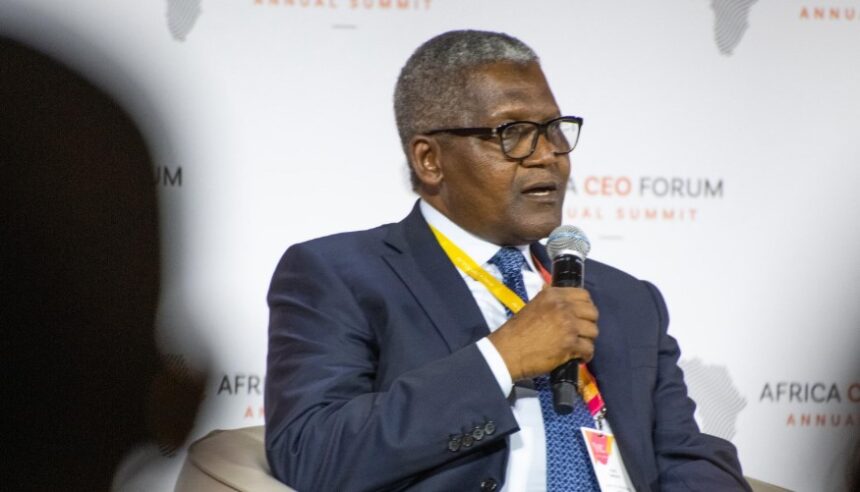The Dangote Petroleum Refinery, a monumental project aimed at achieving Nigerian energy independence, recently achieved a significant milestone by shipping its first consignment of Premium Motor Spirit (PMS), commonly known as petrol, to the United States. This export, amounting to 300,000 barrels, signifies the refinery’s expanding global reach and its growing capacity to compete in international markets. Ironically, this achievement is juxtaposed against the backdrop of continued fuel importation by Nigerian marketers, highlighting a complex dynamic within the country’s downstream petroleum sector. While Dangote aims to transform Nigeria into a net exporter of refined petroleum products, local marketers persist in relying on imports, raising questions about pricing, competition, and the overall effectiveness of the refinery’s impact on the domestic market.
The shipment to the US, confirmed by S&P Global, marks a symbolic victory for the Dangote Refinery, demonstrating its capability to supply fuel beyond African shores. This venture into the American market, a major global importer of petrol, signals the refinery’s ambition to penetrate competitive landscapes and establish itself as a significant player in the global petroleum trade. This move comes amidst reports of shutdowns and maintenance at several foreign refineries, creating an opportune moment for Dangote to capitalize on the increased demand. However, the persistence of fuel importation within Nigeria, despite the refinery’s substantial 650,000-barrel-per-day capacity, unveils a disconnect between domestic production and consumption patterns.
The continued reliance on imported fuel by Nigerian marketers underscores a complex interplay of factors influencing the downstream petroleum sector. Reports indicate that over one billion litres of imported petrol were supplied and distributed in June 2025 alone, a stark contrast to the 455 million litres supplied by the Dangote Refinery during the same period. This disparity reveals the enduring influence of established import routes and the challenges faced by the Dangote Refinery in fully capturing the domestic market. Marketers cite profit margins as a key determinant in their sourcing decisions, suggesting that pricing differentials between imported and locally refined fuel play a crucial role in their purchasing choices.
The Dangote Group, in response to the continued importation and to optimize its trade flows, has adopted a strategy of diversifying its customer base. The export to the US, alongside previous shipments to African countries, the Middle East, and Southeast Asia, reflects this effort to expand market reach and maximize production capacity. This diversification strategy allows the refinery to navigate the complexities of the domestic market while simultaneously establishing a presence in international markets. However, the ongoing preference for imported fuel by Nigerian marketers poses a challenge to the refinery’s long-term goal of achieving fuel self-sufficiency for Nigeria.
Marketers, represented by the National President of the Petroleum Products Retail Outlet Owners Association of Nigeria (PETROAN), Billy Gillis-Harry, emphasize the importance of profit margins in their decision-making process. They assert the right to source fuel from any supplier offering the most advantageous terms, regardless of origin. While acknowledging the potential benefits of the Dangote Refinery, marketers prioritize their own business models and cost considerations. This perspective highlights the inherent tension between national aspirations for energy independence and the pragmatic realities of a competitive market where price plays a dominant role.
The Dangote Refinery’s entry into the US market, while a significant achievement, also raises concerns about the future of Nigeria’s downstream petroleum sector. Aliko Dangote, the President of the Dangote Group, has been vocal about his desire to curb fuel importation and promote local refining. He has even called for the inclusion of refined petroleum products under the “Nigeria First” policy, arguing that continued importation undermines local production and discourages investment. He also alleges that some imported fuel is of substandard quality and benefits from unfair subsidies, creating an uneven playing field for domestic refiners. This raises crucial questions about the regulatory framework governing fuel imports and the need for policies that effectively support local production while ensuring fair competition. The ongoing debate underscores the complexities of transitioning from an import-dependent nation to a self-sufficient producer in a globalized market. The success of the Dangote Refinery, both domestically and internationally, will depend on navigating these complexities and striking a balance between commercial viability and national energy goals.














